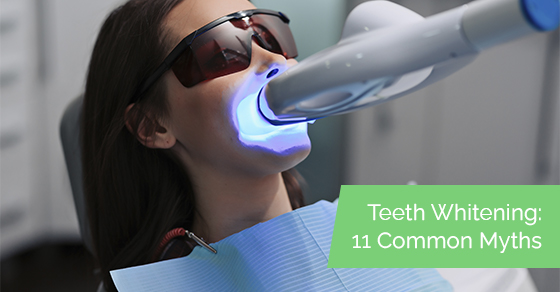Blog

Teeth Whitening: 11 Common Myths
Posted by Dr. Julie Boudreault On 26-04-2023
Everyone wants a bright, white, and glistening smile they're proud to show off to the world. A dull, stained, and discoloured grin, on the other hand, can affect your confidence. Fortunately, several safe and effective teeth whitening services are available to our patients in Milton.
That said, many people still fall for various common teeth-whitening myths. As a result, they can make poor oral health decisions, such as saying yes to risky and ineffective teeth whitening products.
So let's establish the facts, shall we?
Myth #1: Teeth Whitening Damages Tooth Enamel
The most common concern we hear from patients considering a tooth whitening procedure is that it will damage their enamel. While it is true that some whitening solutions can harm tooth enamel, this is (fortunately) entirely avoidable.
If a whitening product is misapplied, left on for too long, or not a good product, it can cause irreversible damage. Whereas professional whitening treatments from your dentist are relatively safe, over-the-counter products have considerably more risk.
These at-home whitening kits often lead to adverse reactions and unsatisfactory results.
Myth #2: Over the Counter Products Are Just as Effective as Treatments from Your Dentist
Your dentist's teeth whitening services are the best way to achieve that pearly white smile. Over-the-counter products, on the other, often fail to deliver the results you're looking for.
These solutions frequently lack the necessary active ingredients required to whiten teeth effectively. Moreover, you can have uneven whitening if the solution is misapplied.
The most effective whitening treatment is the one provided by your dentist.
Myth #3: All Over the Counter Whitening Products are Safe to Use
Although not all over-the-counter whitening products will damage tooth enamel and harm oral health, many are. Some of these products contain dangerous chemicals or large quantities of substances that are only safe in small amounts.
It's simply not worth the risk.
Do not jeopardize your oral and overall health in pursuit of your perfect smile. Come in and talk to one of our dentists at Milltown Dental instead. We will review your options for teeth whitening services that brighten your smile safely and effectively.
Myth #4: You Can Use Hydrogen Peroxide to Whiten Your Teeth
Hydrogen peroxide is the active ingredient in most whitening products (including our whitening kits at Milltown Dental).
However, you should never directly apply concentrated hydrogen peroxide by itself, as it can cause severe damage to your teeth and gums.
Myth #5: Professional Teeth Whitening Services Take a Long Time
Whether you opt for an in-office laser whitening or a take-home whitening tray, the time it takes is marginal.
Laser whitening can take as little as 20 minutes, whereas our take-home solution must only be worn for 1-2 hours daily.
Myth #6: In-Home Whitening Kits from Your Dentist are Hard to Use
Not at all. We offer professional at-home teeth whitening services that make the whitening process easier without compromising effectiveness.
When you visit Milltown Dental in Milton, we fit you with custom dental trays far better than anything you can get over the counter. These trays allow for an even application while keeping the solution on your teeth and away from the gum line.
Myth #7: You Only Need to Whiten Your Teeth Once
Teeth whitening is not permanent. Every day, your teeth come in contact with substances that cause staining and discolouration.
This fact doesn't change just because you had your teeth whitened. Coffee, wine, dark-coloured foods, tomatoes, and smoking all cause teeth to be dull and yellow. Additionally, teeth can naturally discolour with age.
This information means you will need to continue receiving teeth whitening treatments to keep your smile as bright as possible.
Myth #8: You Have to Stop Drinking Coffee and Wine After a Teeth Whitening Procedure
We would never ask you to give up your coffee and wine permanently. However, it would help if you avoided these beverages for the first few days after treatment. Your teeth are more sensitive after a teeth whitening procedure, so avoiding anything that can cause staining is best.
Of course, coffee, tea, and red wine often lead to discolouration over time. So just be aware that you will need to have whitening done again to combat the normal discolouration due to diet and lifestyle.
Myth #9: Whitening Works on Veneers and Implants
You cannot brighten veneers, implants, and other dental restorations with teeth-whitening products.
The only option is to replace them to match your other teeth. You should always do your best to care for your dental implants and minimize staining.
Myth #10: Healthy Teeth are Always White
Many people associate a healthy mouth with a bright, white smile. However, this isn't the case. The shade of your teeth does not automatically translate to how healthy you are.
Many factors cause teeth to discolour, many of which have little to do with your oral or overall health. Genetics, food and drink, and age all affect the colour of your smile.
That said, sometimes, a yellowing smile indicates that your lifestyle choices are harming your oral health. For example, the nicotine from cigarettes stains teeth yellow or brown. Grinding your teeth can also expose the yellow of the dentin below your enamel.
Teeth Whitening Services in Milton
Are you looking for teeth whitening services in Milton, Ontario? Milltown Dental can help. We offer in-house laser whitening and a take-home whitening kit that is easy to use. Visit us in Milton to learn how to improve your smile by eliminating staining and discolouration.
To learn more about our teeth whitening services in Milton, call Milltown Dental at (833) 318-3281 or contact us here.


Posted on 09-08-2023 by Joy Castillon
It’s commonly done using bleaching agents like hydrogen peroxide. While it can enhance smile aesthetics, it’s essential to consult a dentist for safety and effectiveness, as overuse or improper methods may harm teeth and gums.